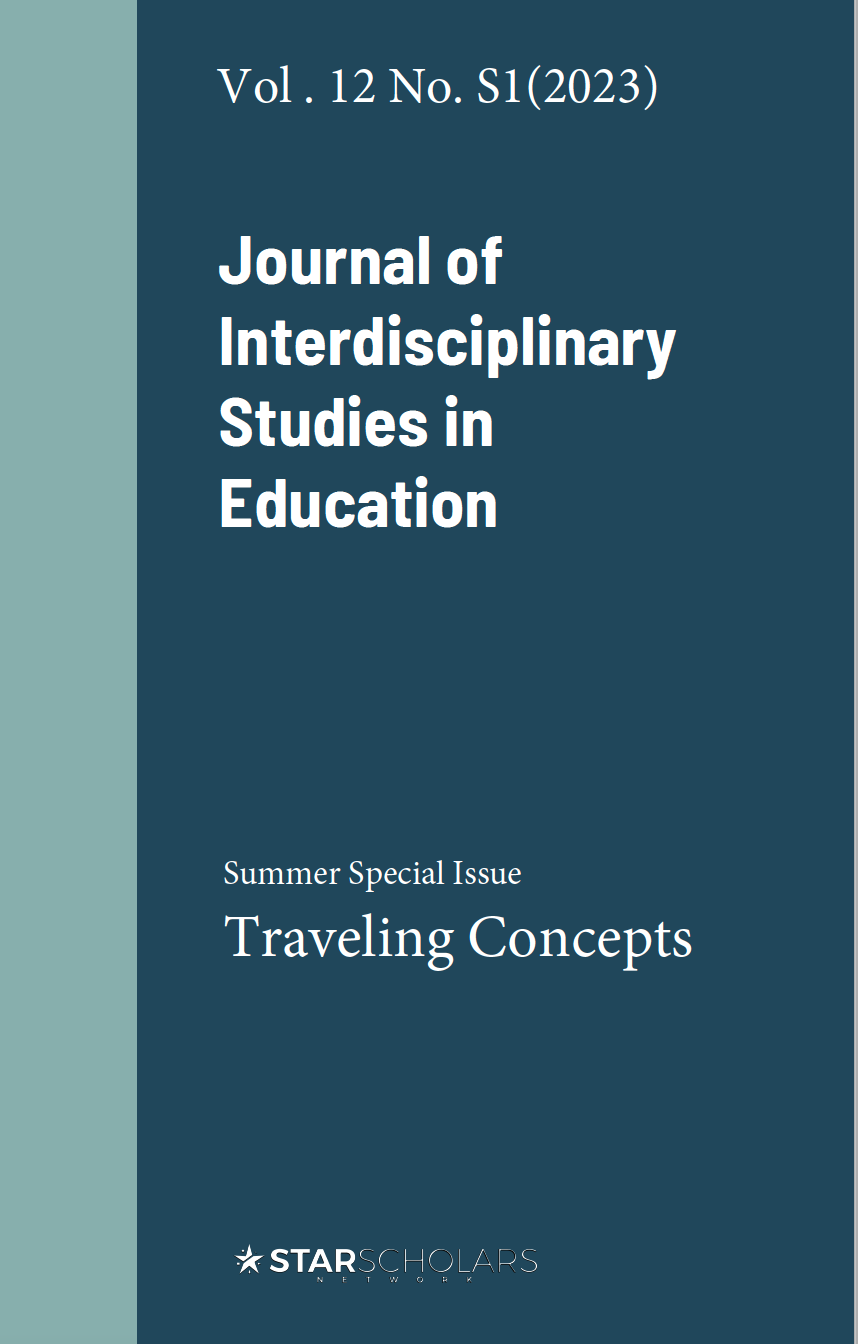Traveling Concepts in the Classroom
Experiences in Interdisciplinary Education
Keywords:
podcasting, travelling concepts, active learning, interdisciplinarity, education, reflectionAbstract
Interdisciplinary research is widely valued and practiced within higher education. However, there is less attention on interdisciplinary teaching and learning, and existing examples often focus on problem-based approaches. The purpose of this special issue is to explore the potential of a concept-based approach to interdisciplinary education, working with the notion of traveling concepts. Traveling concepts refer to the metaphorical traveling or use of concepts within and between disciplines that impacts their meaning, reach, and operational value. This special issue introduction provides a theoretical and conceptual framework around traveling concepts, which special issue contributions then use to reflect on specific interventions. These reflections highlight the importance of interdisciplinarity beyond a problem-solving frame and provide concrete classroom examples to inspire teachers.
Downloads
References
Akkerman, S.F., & Bakker. A. (2011). Boundary crossing and boundary objects. Review of Educational Research, 81(2), 132–169. https://doi.org/10.3102/0034654311404435
Aldrich, J. (2014) Interdisciplinarity: Its role in a discipline-based academy.Oxford University Press.
Angerer, E., Brincker, L., Rowan, E., Scager, K., & Wiegant F. (2021). Interdisciplinary Orientation. Learning to navigate beyond your discipline. Utrecht University.
Ashby, I. & Exter, M. (2019) Designing for interdisciplinarity in higher education; Considerations for instructional designers. TechTrends, 63, 202–208. https://doi.org/10.1007/s11528-018-0352-z
Baer, S. (2013). Traveling concepts: Substantive equality on the road. Tulsa Law Review, 46, 59–80. https://digitalcommons.law.utulsa.edu/tlr/vol46/iss1/9
Baker, M., & Pollard J. (2020). Collaborative team-teaching to promote interdisciplinary learning in the undergraduate classroom: A qualitative study of student experiences. College Teaching, 9(2), 330–354. https://link.gale.com/apps/doc/A662496410/AONE?u=anon~769c964&sid=googleScholar&xid=1f7a7cf9
Bal, M. (2002). Travelling concepts in the humanities: A rough guide. University of Toronto Press.
Baptista, B. V. (2021). Reconfiguring interdisciplinary and transdisciplinary spaces for Arts, Humanities and Social Sciences integration. Revista EducaOnline, 15(2), 45–65.
Berkowitz, D., Pistor, K., & Richard, J. (2003). The transplant effect. American Journal of Comparative Law, 51(1), 163–203. https://doi.org/10.2307/3649143
Culhane, J., Niewolny, K., Clark, S. & Misyak, S. (2018). Exploring the intersections of interdisciplinary teaching, experiential learning, and community engagement: A case study of service learning in practice. International Journal of Teaching and Learning in Higher Education, 30(3), 412–422. https://eric.ed.gov/?id=EJ1199419
De Graaf, B. A., Rinnooy Kan, A., & Molenaar, H. (2017). The Dutch National research agenda in perspective: A reflection on research and science policy in practice. Amsterdam University Press.
de Greef, L., Post, G. Vink, C., & Wenting, L. (2017). Designing interdisciplinary education: A practical handbook for university teachers. Amsterdam University Press.
Frodeman, R., Klein, J. T., & Pacheco, R. C. D. S. (Eds.). (2017). The Oxford handbook of interdisciplinarity. Oxford University Press.
Jacob, J.W. (2015) Interdisciplinary trends in higher education. Palgrave Communications 1(1),1 – 5. https://doi.org/10.1057/palcomms.2015.1
Kelly, R., Mackay, M., Nash, K.L. Cvitanovic, C., Allison, E.H., Armitage, D., Bonn, A., Cooke, S.J., Frusher, S., Fulton, E.A., Halpern, B.S., Lopes, P.F.M., Milner-Gulland, E.J., Peck, M.A., Pecl, G.T., Stephenson, R.L., Werner, F. (2019). Ten tips for developing interdisciplinary socio-ecological researchers. Socio-Ecological Practice Research,1(2), 149–161. https://doi.org/10.1007/s42532-019-00018-2.
Klein, J. T. (1990). Interdisciplinarity: History, theory, and practice. Wayne State University Press.
Klein, J. T. (2021). Beyond interdisciplinarity: Boundary work, communication, and collaboration. Oxford University Press.
Lindvig, K., & Ulriksen, L. (2019). Different, difficult, and local: A review of interdisciplinary teaching activities. The Review of Higher Education, 43(2), 697–725. http://doi.org/10.1353/rhe.2019.0115
Millar, V. (2016) Interdisciplinary curriculum reform in the changing university. Teaching in Higher Education, 21(4): 471–483. https://doi.org/10.1080/13562517.2016.1155549
Menken, S. and Keestra, M. (Eds). (2016). An Introduction to interdisciplinary research: Theory and practice(3rd edition). Amsterdam University Press.
Meyer, J. H., & Land, R. (2005). Threshold concepts and troublesome knowledge (2): Epistemological considerations and a conceptual framework for teaching and learning. Higher Education, 49(3), 373–388. https://doi.org/10.1007/s10734-004-6779-5
National Academies of Science (2005). Facilitating interdisciplinary research. The National Academies Press.
Neumann, B. & Nünning A. (2012). Travelling concepts as a model for the study of culture. In Neumann, B. & Nünning, A. (Eds.), Travelling concepts for the study of culture (pp.1-21). De Gruyter.
Newell, W. H. (2001). A theory of interdisciplinary studies. Issues in Integrative Studies, 19(1), 1–25. http://hdl.handle.net/10323/4378
Newell, W. H. (1994). Designing interdisciplinary courses. New directions for teaching and learning, 1994(58), 35–51. https://doi.org/10.1002/tl.37219945804
Newell, W. H., & Luckie, D. B. (2019). Pedagogy for interdisciplinary habits of mind. Journal of Interdisciplinary Studies in Education, 8(1), 6–20. https://doi.org/10.32674/jise.v8i1.584
Parker, J. E. (2010). Competencies for interdisciplinarity in higher education. International Journal of Sustainability in Higher Education, 11(4), 325–338. https://doi.org/10.1108/14676371011077559
Repko, A.F. & Szostak, R. (2021). Interdisciplinary research: Process and theory (4th edition). Sage.
Rooks, D. & Winkler, C. (2012). Learning interdisciplinarity: service learning and the promise of interdisciplinary teaching. Teaching Sociology, 40(1), 2–20. https://doi.org/10.2307/41503319
Roy, S. G., de Souza, S. P., McGreavy, B., Druschke, C. G., Hart, D. D., & Gardner, K. (2020). Evaluating core competencies and learning outcomes for training the next generation of sustainability researchers. Sustainability Science, 15(2), 619–631. https://doi.org/10.1007/s11625-019-00707-7
Spelt, E. J. H., Biemans, H. J. A., Tobi, H., Luning, P. A., & Mulder, M. (2009). Teaching and learning in interdisciplinary higher education: A systematic review. Educational Psychology Review, 21(4), 365–378. https://doi.org/10.1007/s10648-009-9113-z
Van der Tuin, I. & Verhoeff, N. (2022) Critical concepts for the creative humanities. Rowman & Littlefield.
Veen, M. & Van der Tuin, Iris (2021). When I say… travelling concepts. Medical Education, 55(2), 146 – 147. https://doi.org/10.1111/medu.14400
Visholm, A., Grosen, L., Nom, M.T., & Jensen, R. L. (2012). Interdisciplinary research is key to solving society’s problems. Danish Energy Agency. https://dea.nu/i-farver/publikationer/interdisciplinary-research-is-key-to-solving-society-s-problems/
Weingart, P., & Padberg, B. (2014). University experiments in interdisciplinarity. Obstacles and opportunities. Bielefeld.
Zepke, N. (2013). Threshold concepts and student engagement: Revisiting pedagogical content knowledge. Active Learning in Higher Education, 14(2), 97–107. https://doi.org/10.1177/1469787413481127
Additional Files
Published
Issue
Section
License
Copyright (c) 2022 Tessa Diphoorn, Brianne McGonigle Leyh

This work is licensed under a Creative Commons Attribution-NonCommercial-NoDerivatives 4.0 International License.







